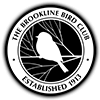Brookline Bird Club
2020 Statistical and Year-End Report
By David Scott, Club Statistician
The Brookline Bird Club recorded 216 species for 2020, based upon 62 reported trips. A total of 215 species were recorded in Massachusetts, with a Glaucous Gull in Hampton, NH the only additional out-of-state species. By themselves, other than being considerably lower than usual, the numbers reveal nothing about the unprecedented circumstances the club experienced in 2020. Trips were cancelled from mid-March through to July, and we missed the entire spring songbird migration period. The club was also unable to schedule any pelagic trips. Instead, for much of the year, many of us focused on enjoying the birds in our own yards and neighborhoods.
The club recorded a few rarities in 2020. Highlights included: King Eider (Cape Ann, January 1), Pacific Loon (Halibut Point, January 25), Western Tanager (Sandwich, February 9), Greater White-fronted Goose (Plum Island, February 16), Barnacle Goose (Rochester, February 22), Townsend’s Solitaire (Halibut Point, February 23), Western Kingbird (Bolton Flats, October 11) and Red Crossbill (Allen’s Pond, November 28). The winter of 2019-2020 was a productive one for alcids, with Razorbill, Black Guillemot, Dovekie and Thick-billed Murre all occurring on multiple trips. The fall of 2020 also saw one of the biggest irruptions of winter finches in many years, and the club had frequent encounters with Pine Siskins and Purple Finches, along with the abundant Red-breasted Nuthatches.
Birds we missed, in most cases for the first time in the club’s history: Ovenbird, Willet, Veery, Least Tern, Chestnut-sided Warbler, Northern Rough-winged Swallow, Piping Plover, Northern Waterthrush, Orchard Oriole, Nashville Warbler, Bank Swallow, American Coot, Blue-winged Warbler, Ruddy Turnstone, American Oystercatcher, Least Flycatcher and many others.
People still went birding throughout 2020, of course, and there were 378 species reported for Massachusetts in eBird, of which the club’s total of 215 represented 57% (down from 75% in 2019). We saw the most species in Essex County (153), followed by Barnstable (108), Worcester (107), Middlesex (99), Bristol (94) and Plymouth (70).
With many of the trips involving multiple locations, there were 130 checklists associated with the 62 reported trips. With a bias this year towards species observed more frequently in the fall and winter months, which likely cost American Robin its number one position, the most frequently reported species were: Song Sparrow (74 checklists), Herring Gull (69), American Crow (64), Black-capped Chickadee (63), Blue Jay (59), Common Eider (59), Mallard (58), American Robin (53), Northern Cardinal (52), Downy Woodpecker (52), Canada Goose (51).
We would like to thank all of our trip leaders for 2020, especially those who worked with the club to re-establish field trips after the lock-down period ended in late summer.
The following table shows the trips reporting the most species by month:
Date Location Species Leader
1/1 New Year’s Day, Essex County 52 Laura de la Flor/Mark Burns
2/15 Annual MA Waterfowl Prowl 51 David Scott
3/15 Halibut Point 31 Peter Van Demark
7/25 Great Meadows 35 Sylvia Martin
8/23 Delaney WMA 35 Cliff Cook
9/5 Daniel Webster 45 Glenn d’Entremont
10/3 Outer Cape Cod 81 Glenn d’Entremont
10/11 Bolton Flats Big Sit (+ pre-dawn) 71 Nicklaus Paulson
11/28 Bristol County 77 Glenn d’Entremont
12/26 Cape Ann 26 John Nelson
The club’s Winter meeting was held on February 29 in Bedford and featured writer and naturalist Scott Weidensaul, who gave an excellent talk based upon his book Return to Wild America: A Yearlong Search for the Continent’s Natural Soul. In the book, Weidensaul retraces the journey undertaken by Roger Peterson and James Fisher in 1955, to explore how the continent’s landscapes have changed over the previous half century, and the impact of conservation efforts to preserve and restore the natural world. The BBC’s annual meeting usually takes place in the Spring but was postponed until the Fall as the club adapted to our new online reality. Don Kroodsma gave a highly entertaining virtual presentation on October 23, based on his recent book Birdsong for the Curious Naturalist. The talk included terrific insights into both the “how” and the “why” of birdsong and encouraged listeners to explore more deeply through the associated website: http://birdsongforthecurious.com.
